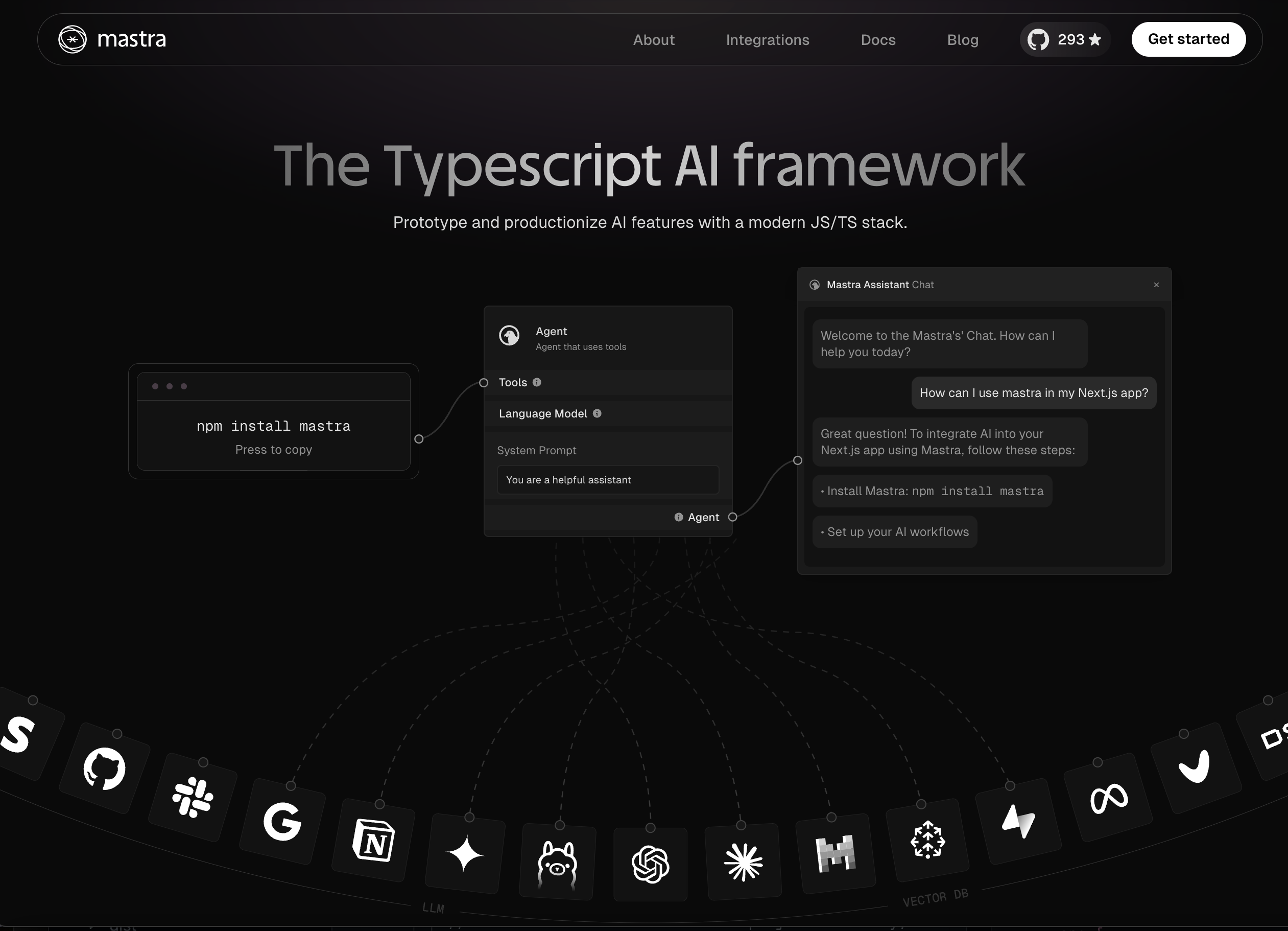Mastra is an opinionated Typescript framework that helps you build AI applications and features quickly. It gives you the set of primitives you need: workflows, agents, RAG, integrations, syncs and evals. You can run Mastra on your local machine, or deploy to a serverless cloud.
The main Mastra features are:
| Features | Description |
|---|---|
| LLM Models | Mastra supports a variety of LLM providers, including OpenAI, Anthropic, Google Gemini. You can choose the specific model and provider, choose system and user prompts, and decide whether to stream the response. |
| Agents | Agents are systems where the language model chooses a sequence of actions. In Mastra, agents provide LLM models with tools, workflows, and synced data. Agents can call your own functions or APIs of third-party integrations and access knowledge bases you build. |
| Tools | Tools are typed functions that can be executed by agents or workflows, with built-in integration access and parameter validation. Each tool has a schema that defines its inputs, an executor function that implements its logic, and access to configured integrations. |
| Workflows | Workflows are durable graph-based state machines. They have loops, branching, wait for human input, embed other workflows, do error handling, retries, parsing and so on. They can be built in code or with a visual editor. Each step in a workflow has built-in OpenTelemetry tracing. |
| RAG | Retrieval-augemented generation (RAG) lets you construct a knowledge base for agents. RAG is an ETL pipeline with specific querying techniques, including chunking, embedding, and vector search. |
| Integrations & Syncs | In Mastra, syncs are async functions that can be deployed as background tasks across different execution environments. Integrations are auto-generated, type-safe API clients for third-party services that can be used as tools for agents or steps in workflows. |
| Evals | Evals are automated tests that evaluate LLM outputs using model-graded, rule-based, and statistical methods. Each eval returns a normalized score between 0-1 that can be logged and compared. Evals can be customized with your own prompts and scoring functions. |
- Node.js (v20.0+)
If you don't have an API key for an LLM provider, you can get one from the following services:
If you don't have an account with these providers, you can sign up and get an API key. OpenAI and Anthropic require a credit card to get an API key. Gemini does not and has a generous free tier for its API.
As a first step, create a project directory and navigate into it:
mkdir hello-mastra
cd hello-mastraNext, initialize a TypeScript project using npm:
npm init -y
npm install typescript tsx @types/node @mastra/core@alpha --save-devmkdir src
touch src/index.tsThen, add this code to src/index.ts:
import { Agent } from '@mastra/core';
async function main() {
const agent = new Agent({
name: 'story-writer',
maxSteps: 3,
model: {
provider: 'OPEN_AI',
name: 'gpt-4o',
toolChoice: 'auto',
},
instructions: `You are a helpful assistant who writes creative stories.`,
tools: {},
});
const result = await agent.text({
messages: ['Write a short story about a robot learning to paint.'],
});
console.log('Agent response:', result.text);
}
main();Finally, run the script:
OPENAI_API_KEY=<your-openai-api-key> npx tsx src/index.tsIf you're using Anthropic, set the ANTHROPIC_API_KEY. If you're using Gemini, set the GOOGLE_GENERATIVE_AI_API_KEY.
We have an open community Discord. Come and say hello and let us know if you have any questions or need any help getting things running.
It's also super helpful if you leave the project a star here at the top of the page
